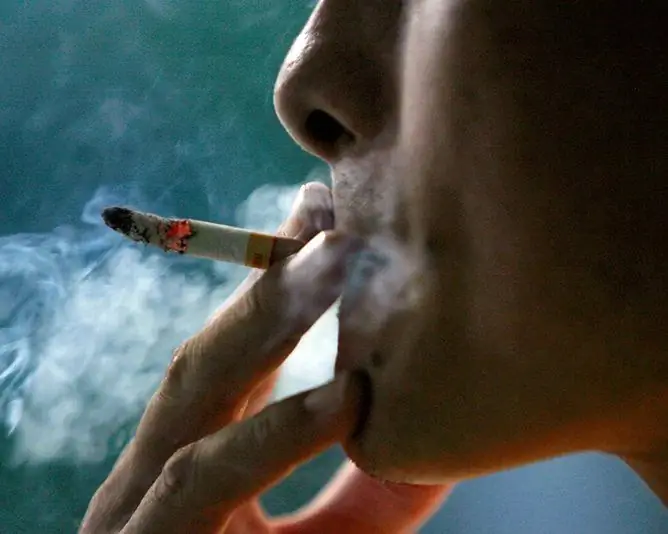- Author Rachel Wainwright wainwright@abchealthonline.com.
- Public 2023-12-15 07:39.
- Last modified 2025-11-02 20:14.
Increases coffee pressure or lowers
The content of the article:
- Coffee and its effects
- How coffee affects human pressure
- Other health benefits of coffee
- Why coffee can be harmful and contraindicated for consumption
- General information about arterial hyper- and hypotension
- Video
Coffee raises blood pressure because it is a natural tonic and one of the most commonly consumed drinks in the world. Why is the question of whether coffee increases or lowers blood pressure remains open to many? It turns out there are reasons for this.

Coffee can both raise and lower blood pressure under certain conditions
Coffee and its effects
The doctors' comments on coffee are not categorical, most of them tend to consider it useful in moderation (no more than three cups a day), of course, in the absence of contraindications for the person. In this case, it is recommended to make a choice in favor of a natural rather than an instant drink. Given the diuretic effect of coffee, when drinking it, it is necessary to compensate for the loss of fluid. To this end, many cafes serve coffee with a glass of water - you shouldn't neglect it.
The caffeine in coffee tones the blood vessels and improves blood circulation, making coffee an effective way to improve performance. The pronounced stimulating effect of caffeine on the nervous system usually begins 15-20 minutes after consumption, its accumulation in the body does not occur, therefore the tonic effect does not last long.
If you drink coffee regularly for a long time, the body becomes less susceptible to the action of caffeine, and tolerance develops. Other factors that determine the effect of coffee on the body include genetic predisposition, features of the nervous system, the presence of certain diseases. The person's baseline blood pressure is also influenced.
It should be noted that not only coffee, but also other drinks containing caffeine (green and black strong tea, energy drinks) can affect the level of blood pressure.
How coffee affects human pressure
As a result of the studies conducted, it was found that most often coffee raises blood pressure and quickens the pulse for a short time after drinking the drink, after which it soon returns to its original value. A temporary increase is usually no more than 10 mm Hg. Art.
However, blood pressure does not always rise after drinking. Thus, a moderate portion of coffee (1-2 cups) may not have any effect on a healthy person with normal blood pressure.
In hypertensive patients, coffee helps maintain high blood pressure. For this reason, such patients are usually not advised to drink it at all, or indicated to reduce consumption to 1-2 small cups a day. Contrary to popular belief, the pressure rises when drinking coffee with milk, especially if you drink it in large quantities.
Sometimes an opinion is expressed, in particular, the famous TV doctor Elena Malysheva adheres to it, which, due to the diuretic effect of coffee, lowers blood pressure. However, the diuretic effect of coffee is delayed in relation to the excitatory one, rather it can be considered as a compensatory mechanism that neutralizes the increased vascular tone and makes coffee less dangerous for hypertensive drink than was previously thought. Be that as it may, taking into account the individual reaction of each organism, with a tendency to arterial hypertension about whether it is possible to drink coffee with high blood pressure, you should consult your doctor.
In patients with low blood pressure, coffee normalizes the indicator, and also relieves the symptoms characteristic of arterial hypotension (lethargy, fatigue, drowsiness), which significantly improves the quality of life of people with low blood pressure. However, hypotonic patients should take into account that coffee increases blood pressure in case of moderate consumption, and if you drink it too often, blood pressure decreases. This is due to the diuretic effect of coffee and caused by excessive dehydration.
Other health benefits of coffee
Caffeine is widely used in medicine. It is used for headaches, as an energy drink with a decrease in vitality, and is able to briefly improve attention and the ability to concentrate. Several studies support the antioxidant properties of caffeine, including the ability to prevent the development of cancer.
Since the substance has a diuretic effect, it can be used when it is necessary to remove excess fluid from the body (for example, with edema).
In addition, natural coffee contains vitamins (B 1, B 2, PP), micro and macro elements necessary for the normal functioning of the body. Thus, potassium and iron contained in the aromatic drink help to improve the functioning of the heart and normalize the level of hemoglobin in the blood, preventing the development of iron deficiency anemia.
Coffee helps to improve mood, moreover, it is a low-calorie drink that reduces a person's appetite and cravings for sweets, for this reason it is often included in diet for weight loss.
When consumed regularly, coffee increases the sensitivity of cells to insulin, thereby reducing the risk of developing type 2 diabetes. The drink reduces the risk of liver cirrhosis, and also has a slight laxative effect, preventing the development of constipation.
Why coffee can be harmful and contraindicated for consumption
Despite the many beneficial properties, it is not recommended for children under 14 years old to drink coffee - their nervous system does not cope well with additional stimulation, and does not need it.
Caffeine is addictive, which is another reason why you should not overuse coffee.
Because of the stimulating effect, you should not drink coffee before bedtime, and indeed in the evening. This is especially true for people suffering from insomnia.
If the patient has high intracranial pressure, it is also better to refuse to drink coffee.
People with visual impairments should drink coffee with caution, since coffee can raise intraocular pressure.

It is believed that coffee with milk does not affect pressure, but this is not so - the properties of black coffee are preserved when milk is added
Coffee has a negative effect on calcium metabolism, for this reason it is not recommended to drink it for the elderly and children at an age when the skeleton is in the phase of active growth. Decreased blood calcium levels contribute to a decrease in bone density and increase the risk of fractures.
Caffeine has the ability to cross the placenta and increase the heart rate in the developing fetus, which is undesirable. Coffee abuse while carrying a baby increases the risk of miscarriage, premature birth, stillbirth and low birth weight, so women should drink coffee in moderation during pregnancy. With late toxicosis (gestosis) or an increased risk of its development, coffee is contraindicated.
General information about arterial hyper- and hypotension
The optimal blood pressure in humans is 100-120 to 60-80 mm Hg. Art., although the individual rate may deviate somewhat from these ranges, usually within 10 mm Hg. Art.
Arterial hypotension (hypotension) is usually diagnosed when blood pressure drops more than 20% from baseline values.
Arterial hypertension (hypertension) is more common and has three degrees:
- hypertension of 1 degree (pressure from 140 to 90 to 159 to 99 mm Hg);
- hypertension of the 2nd degree (pressure from 160 to 100 to 179 to 109 mm Hg);
- hypertension of 3 degrees (pressure from 180 to 110 mm Hg and above).
With both of these deviations, it is necessary to consult with your doctor about the possibility of drinking coffee.
Video
We offer for viewing a video on the topic of the article.

Anna Aksenova Medical journalist About the author
Education: 2004-2007 "First Kiev Medical College" specialty "Laboratory Diagnostics".
Found a mistake in the text? Select it and press Ctrl + Enter.






